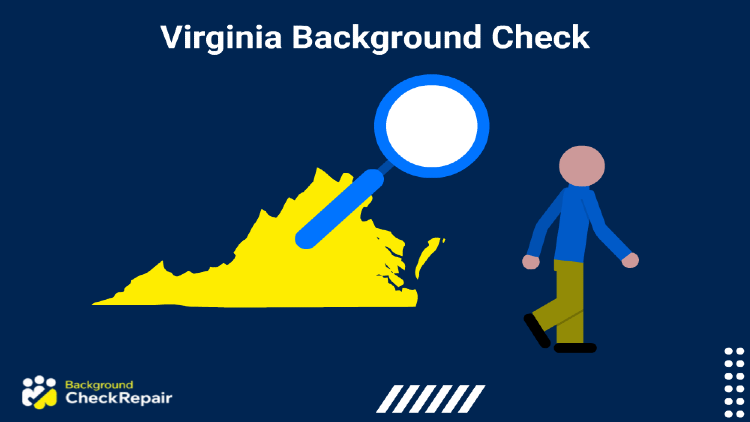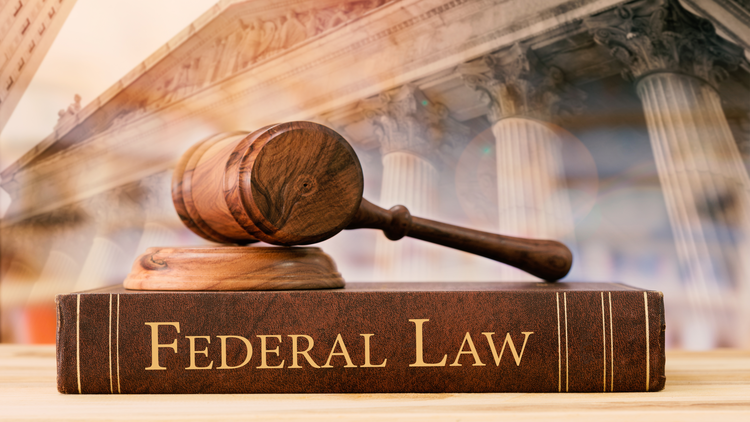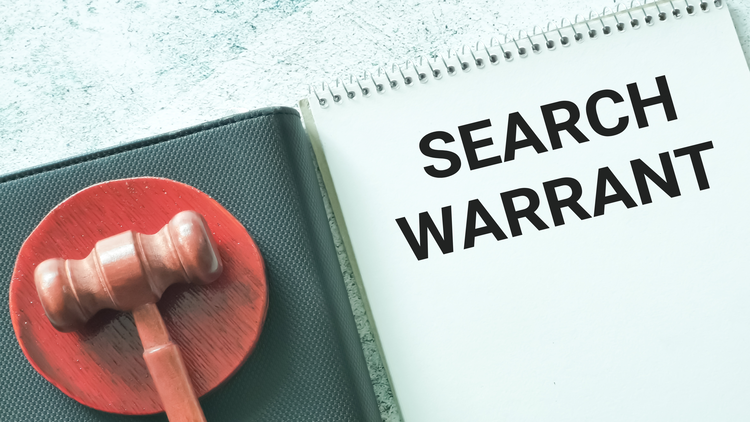We use cookies to ensure that we give you the best experience on our website. If you continue to use this site we will assume that you are happy with it
Virginia Background Check (VA) Guide: Follow This 5 Day Rule
 Written by Background Check Repair
Written by Background Check Repair
Background Checks | June 10, 2024

Table of Contents
When running a Virginia background check (VA), it is important to remember all state guidelines, especially the 5-day rule. Like all other states, Virginia has both federal and state laws that determine what personal reports can legally include. However, the 5-day rule is arguably one of the most important laws to remember in Virginia. This rule is somewhat unique compared to other US states, so it is important to fully understand its implications.
Many employers often request permission from job candidates to run a background check during the hiring process. Federal and state laws help protect job candidates from privacy invasion and discrimination, while also helping employers select strong candidates.
This guide to Virginia background check laws and performance will help remove some of the guesswork and ensure you are aware of the state’s applicable laws, including how to follow this 5-day rule.
What Is the 5-Day Rule?
The “5-day rule” refers to the 5 days that public records officers in the state of Virginia have to respond to public information requests. However, the officers who process these requests may ask for a 7-day extension, to allow more time to search public records and produce a comprehensive report.1
This 5-day rule can have serious implications, so it is important to understand what it includes. For instance, this rule applies to the sale and transfer of firearms, or guns. If the Virginia State Police does not complete a background check for a firearms sale or transfer within 5 days, the firearm dealer may complete the sale, without an official screening. This means that any background check that is delayed could lead to the unsafe transfer or purchase of a firearm.
Prior to March 2021, the state police in Virginia had only 3 days to complete the check. It is important for firearms dealers to note this change, to ensure they are in compliance with applicable laws.2
What Federal Laws Apply to Background Checks?
The Freedom of Information Act (FOIA) is a comprehensive federal law that ensures that citizens have free and equal access to information, like a federal or warrant record search in California. If an individual cannot find public information that they are seeking, that they legally are entitled to, they can file a FOIA request to obtain the information. For instance, an individual can file a FOIA request to find out if there are any warrants against a potential job applicant, any arrest records for a housing applicant, or other criminal records.
The US Freedom of Information Act allows for more comprehensive checks done by the general public, as well as employers and private organizations. Before submitting a request through the FOIA, ensure that the information is not otherwise available in your state or through a local organization. If it is otherwise available through other public records, your request will be denied.

The US Federal Trade Commission (FTC) and the US Equal Employment Opportunity Commission (EEOC) are both federal agencies that help regulate background checks throughout the country. Both serve vital purposes to both employees and employers.
First, the FTC works on enforcing the Fair Credit Reporting Act (FCRA), which regulates how much information third-party background check companies can reveal to employers. Remember that if you are conducting a background check for professional reasons, including filing a FOIA request for a job applicant, you have to first receive consent from the job applicant. The US Fair Credit Reporting Act (FCRA) states that individuals conducting a background check for professional reasons need to first seek consent from the individual, before beginning the screening. However, if a background check is related to personal reasons, such as dating, you do not need to seek permission. In general, the Fair Credit Reporting Act helps provide protections for job candidates during pre-employment background checks.
The US Equal Employment Opportunity Commission is another federal agency, which also ensures that employers remain in compliance with applicable laws, especially in terms of preventing discrimination. If you believe you were discriminated against by an employer during the hiring process, you should contact the EEOC and also consider calling an attorney.
Additionally, the US National Child Protection Act/Volunteers for Children Act allows certain organizations to screen the history of an individual using fingerprints. These organizations include those that work with vulnerable populations, such as children, the disabled, or the elderly.
How Can Someone Obtain a Virginia Criminal History Record Check?
There are two ways to obtain an official criminal record check. Public records are provided by the Civil and Applicant Records Exchange (CARE), a department of the state police. CARE conducts criminal records searches for employment purposes, rather than for criminal justice entities. When obtaining criminal history reports through CARE, ensure you use the correct form, depending on the purpose of your background check. After filling out the form, CARE requests that you please mail it, rather than request records in person.

First, the general public, individuals, and private organizations are permitted to request criminal history record dissemination, via a signed and notarized form. This form helps any person find criminal records in the state.
Second, approved Virginia agencies can submit a request for a criminal background check, without a notarized form. These organizations include adult home care facilities, hospitals and pharmacies, daycare centers, and adoption and foster care agencies.
In contrast with CARE, the Central Criminal Records Exchange (CCRE) exists to conduct checks for criminal justice entities. Remember to request information through CARE for criminal background checks for employment purposes.
Agencies that have access to CCRE records include school boards, government offices, specific volunteer organizations, and related organizations. Any Virginia Court also has access to the CCRE, which provides them with the full history of criminals living in Virginia.
Certain organizations in Virginia may also qualify to be part of the Non-Criminal Justice Interface (NCJI). This is a system that provides non-criminal organizations in Virginia with almost immediate results for a criminal history records check. Agencies can search any name in the database, to search all Virginia criminal records. However, to access this database, agencies must sign an agreement with the Department of State Police and submit payment. If approved to use this system, both public and private companies can use the Non-Criminal Justice Interface to screen new employees or other individuals necessary for their business. For instance, the Non-Criminal Justice Interface can provide verification of a job candidate’s identity, criminal records, and more pertaining to Virginia public records.
It is important to note that only state residents of Virginia can request records through the state police. Non-residents must issue background checks through third-party organizations, rather than official state resources.1
Many people wonder if background investigations reveal outstanding warrants, or want to know whether a person is currently incarcerated, and the answer depends on the specific state.
Are Obtaining Criminal History Background Checks Free?
No, it is not free to obtain criminal reports in Virginia.

A CARE search costs $13.75, and a full Federal Bureau of Investigation file costs $13.25. For agencies interested in registering with the NCJI, payment is also required on a continuous basis.
These fees are intended to cover the cost of service, search, and duplication of records.
What Does a Virginia Background Check Include? Does It Include Virginia Public Records and Virginia Criminal Records?
A criminal background check obtained in Virginia through the Virginia Department of State will only reveal records related to Virginia crimes.
These criminal records include arrest records, incarcerations in Virginia’s four state prisons, and criminal convictions. Background reports often describe the type of offense, whether it is a misdemeanor or felony, and the circumstances surrounding the crime. They include the date of the arrest, the severity of the charge, and any applicable sentence information.
In contrast, a fingerprint background check will reveal national convictions, arrests, and more throughout the country, in other states aside from Virginia.1
Inmate records can also be requested in Virginia. These reports will include personal information of the inmate like name and birth date, mugshot, the location of the inmate, custody status, and related information. Any person can search for inmate records using the Offender Locator, a free tool provided by the Virginia Department of Corrections.
A Virginia background check also includes various forms of verification. First, background checks can verify education, including any degrees, diplomas, or certificates earned by individuals. They can also verify employment, by providing information on past employers, as well as the date and job title of past employment.
If you are a Virginia resident, you can also submit your own fingerprints or request a criminal record to see what is revealed on your own record. If you are not an official Virginia resident but may be screened by an organization in Virginia, you could also consider running a level-2 check on yourself through a third-party background check organization. This could help determine whether or not you will pass a background report in Virginia and therefore will qualify for certain opportunities such as a job or volunteer position.

It is also important to know what is on your criminal record so that you can dispute any incorrect information. If an employer denies you a job opportunity due to your criminal record, they must provide a copy of the background report as well as a “Summary of Rights”, which includes the contact information of the third-party organization. The right to this summary is protected by federal law, so be sure that you receive it in case you are denied employment. If you did not receive a Summary of Rights, contact the Federal Trade Commission, a lawyer or attorney, and the company that conducted the check right away. Sometimes, cheaper background check websites, rather than the State Police check, can result in inaccurate data. As a result, if you are a Virginia state resident, it is in your best interest to conduct background checks through the state, to obtain the most accurate information.
Are There Any Other Background Check Laws Specific to Virginia?
A background check may also involve obtaining court records. An individual can also request court records from the Virginia court system. To obtain these records, you should visit the courthouse where the court case or trial occurred. You will have to present a written request to the clerk of court at this specific courthouse, to later obtain the records if the request is approved.
In compliance with the Fair Credit Reporting Act, background checks and person find Virginia cannot include information on arrests that did not result in a conviction that is older than seven years. However, this does not apply to positions that earn more than $75,000 per year. For these positions, any arrest records can appear on background checks, even those that did not result in a conviction.2
Virginia also has a ban the box law, which applies only for public or government positions. The “box” refers to the question on a job application asking about criminal history. This law prevents public employers from asking job candidates about their criminal history in the early stages of the application process. This helps ensure that the best candidates make it to the final stages of the hiring process, without bias due to criminal history. Several other states now also have ban the box laws, such as New York and California. However, these states’ laws apply to both the public and private sectors.
While the ban the box law only applies to the public sector, there are few regulations for job applications in the private sector. For example, there is a ban the box law concerning marijuana possession, for both the public and private sectors. This law prevents employers from asking applicants about arrests or convictions due to simple marijuana possession, in the initial hiring stages.
Whether you are a potential employee or employer, make sure to follow all applicable laws and regulations. In particular, pay attention to the 5-day rule, which can have important implications before running any Virginia background check so that the reports are both legal and fair.
References
1Backgroundchecks.org. Virginia Public Records. Nd. 15 November 2021. Web. <https://backgroundchecks.org/virginia-public-records.html#What_does_the_Virginia_public_records_law_say>
2Penn, S. WHSV. New Virginia law extends background check deadline for gun sales. 15 March 2021. 15 November 2021. Web. <https://www.whsv.com/2021/03/15/new-virginia-law-extends-background-check-deadline-for-gun-sales/>
